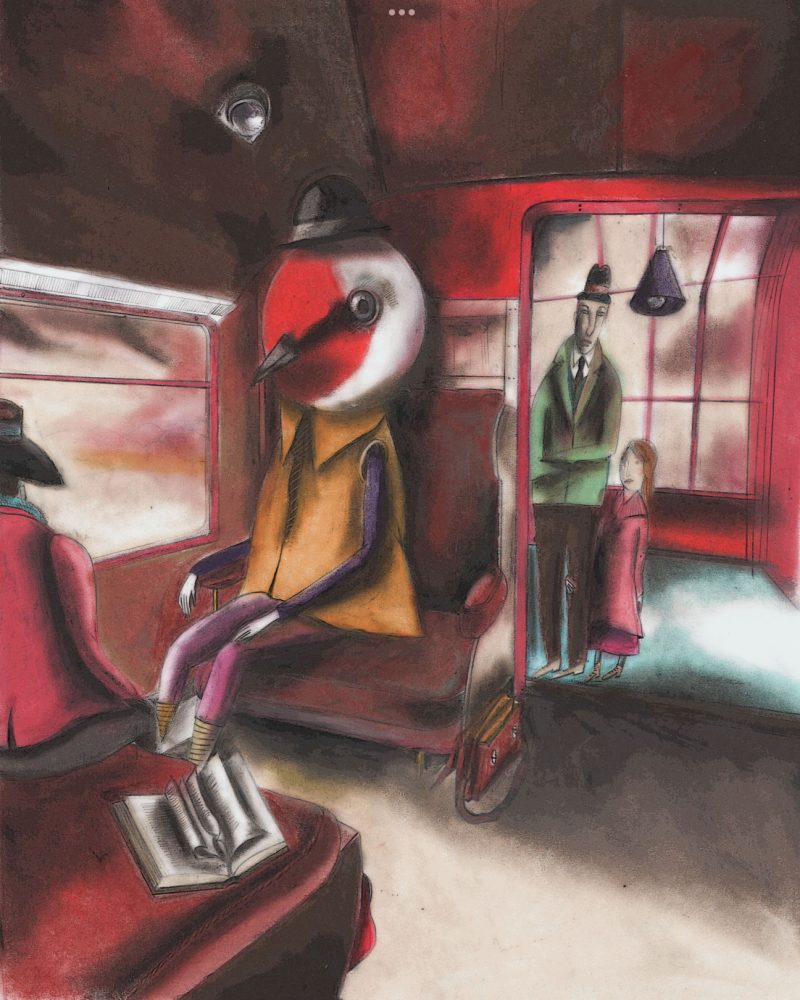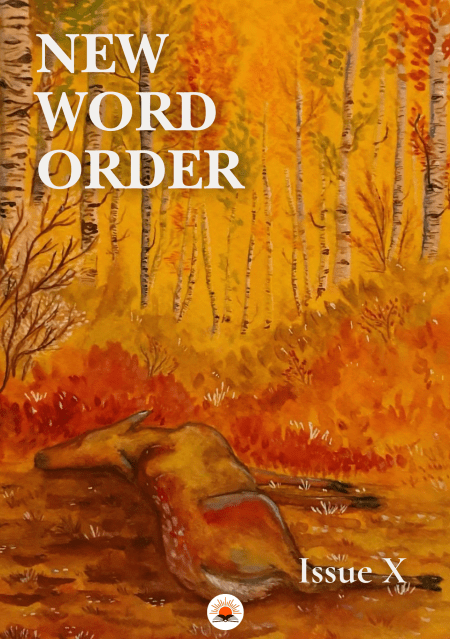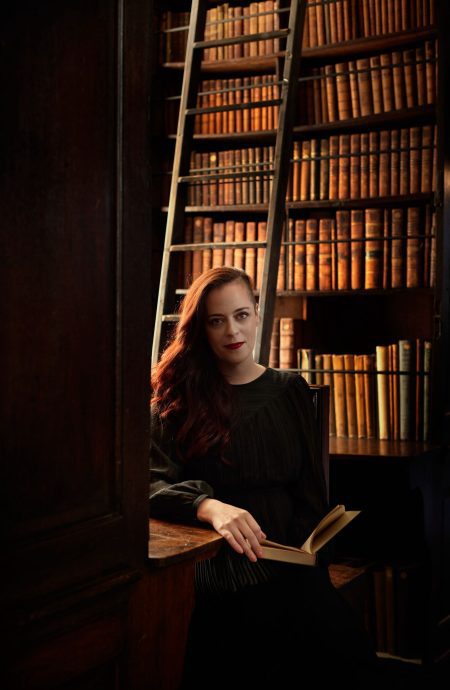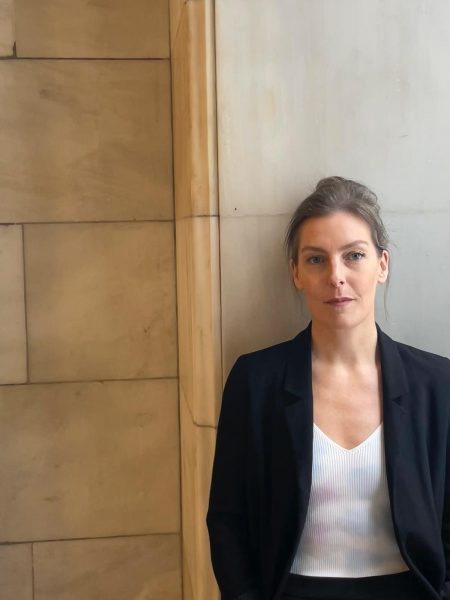written by Eimhin O’Loinsigh. Éimhin (He/Him) is a fourth year English and History student in St. Patrick’s College Carlow from Portlaoise, Co. Laois. He has had a passion for storytelling from a young age but didn’t endeavour to write any stories himself until his second year of college where he entered and won first place with his story Lady of Winter. Since then, he has written many stories and started yet more, all varying in quality.
By the time Brian reached the train station he felt ready to drop. It was a poor kind of day; first, he had missed his bus and had to run to work, only to then realise he left his folder at home, then, he got ate by his boss for not being prepared for his meeting. Finally, he got news he was being sent to Dublin. Thus, he had to walk all
the way across the city in his dress shoes which looked wonderful, normally, but weren’t well suited to long walks. Their normal look had been tarnished by a spray of dirty water from a speeding car. In fact, his clothes had also been dirtied when Brian had to dive out of the way of the maniac. So, blistered feet and wet denim were the state he found himself in when he finally got to sit down on the station’s bench on platform two.
Those benches, hard and forever cold, might as well have been the most delicate ottoman covered in silk down. He checked his watch, a digital model, and saw that he had half an hour before the train arrived. Looking around he saw no one else in the station. He decided to set an alarm for twenty-five minutes, seeing as there was no one around to do anything untoward while he slept. Alarm set, he leaned back across the bench and shut his eyes, drifting off into an inviting world of vibrant visions of his fiancée Mateja’s auburn hair. The strands were floating around the air like she was underwater, one errant strand cutting across her bottom lip which was delicately painted in a layer of lip gloss that smelled of elderflower and pear. He began to feel himself floating upwards, as was she. She reached out her hand and the two floated together. Brian was rather unphased by this sudden buoyancy, focusing more on her amber-gem eyes. There was a warmth building deep in his abdomen as he gazed into her eyes. He never liked having to leave her for extended periods, and even more so now that they were engaged. When he rang her earlier in the day she acted as if it didn’t bother her much, his going to Dublin, but she was a terrible actress. He would make it up to her. A nice, quiet meal (a coq au vin accompanied by a red Burgundy for her and a glass or two of Redbreast for him) enjoyed by candlelight that would set her eyes in a fiery hue.
As was a common occurrence for Brian, his dreams shifted into a Romantic landscape complete with rolling hills veiled in golden cereal crops speckled with the little black figures of distant labourers. He leaned against a fence, beside him his childhood dog Conall gnawed on a postman’s leg. The wind kissed his face with a kind of nostalgic warmth found only in memory. Soon his father would pull up the driveway in his Ford Fiesta and Brian would be off to the city. But for now, he drank in the view.
He awoke softly, gradually. The alarm hadn’t gone off, or if it had, it failed to wake Brian. He rubbed the sleep from his eyes and looked down at his watch. Half ten. He had surely missed the train. Fuck sake. What am I going to do now? He looked around the station without any real idea of what he expected to see. Perhaps someone would miraculously offer to drive him, a good Samaritan for the modern age. Instead, he found only a platform partially lit by orange streetlights and completely devoid of any other life. Not even a rat or bird wanted to be there. He just sat there, unsure of what to do. A strange melancholy had met him when he
rejoined the world of the waking.
While he considered leaving his job–God only knows he had made many plans to before–he noticed a flicker in the corner of his vision. Looking down the track he saw the pin of light from a distant train. He looked at his watch again. Quarter to eleven. The trains usually stopped at ten. Brian looked at the light as it grew closer
and closer, eventually being accompanied by the sound of carriages rolling on the track. It was definitely a train. Maybe they had chosen to run a late train, or– this seeming the more likely option to Brian–they were bringing it in for maintenance. Either way, it would do no harm to check when it pulled in.
The train, rather unremarkable and typical of an Iarnród Éireann intercity model, slowed to a stop just beyond the yellow lined edge of the platform. Only one door opened and out stepped a strange lad, dressed like one of the train attendants you’d see in a Western film, complete with a navy blue hat. “Hello sir.” He said, looking
at Brian.
“Hello”, he replied, “is this train running?”
“Isn’t it always?” the attendant said.
“It is? I never knew they ran a train this late.”
“Not many do.” This man was odd, to be sure. Yet Brian felt invited. His face was strong and adorned with a magnificently bushy moustache, completed with a decidedly imperfect smile of crooked teeth that was friendly. Brian had seen many men like him growing up. He felt right at home.
“Does it go to Dublin?”
The attendant didn’t say anything but waved Brian inside. Brian took out his wallet to pay for a ticket, but the attendant raised a hand dismissively. “No need, going to Dublin is costly enough.” Too true, Brian winced while stepping into the carriage.
Most of the seats were empty, all bar six of them. He slipped along the aisle and took a seat in one of the groups of four seats. To his left, across the aisle, he saw a familiar face. Mrs. Redmond was a lovely woman who lived only a kilometre from Brian’s family home growing up. He was often sent down to her house to help her and her husband with work or simply to deliver bread his mother had made. While many young lads might have bemoaned having to spend their free time cutting back briars or stacking turf, Brian loved it. Not only did it make him feel useful, but the few pound she would put in his jacket pocket for sweets was a boon. She looked exactly like he remembered her: rosy cheeks full of that kind of motherly love for all possessed by a select few; thick silver hair; and a little mark on the end of her nose. She had told him when he was young that she got it from a feather in her pillow, a story he now realised suddenly–and with a degree of shame at the length it took to realise-–was a fabrication.
“Mrs. Redmond?” he asked.
“Oh, Brian, I hadn’t noticed you.” She turned in her seat to look at him. “Well, didn’t you grow into a fine young chap.”
“How have you been?”
“I have been wonderful darling, thank you for asking,” she said. “How are
things back in Ballymurdoch these days?”
Ballymurdoch. It was like something out of a Joseph Kavanagh painting in Brian’s memory. Perhaps it was rose-tinted glass, that was certainly the belief of the lads in work who thought it little more than somewhere you went through to avoid the motorway. Still, Brian would agonize over small details in his mind. The exact rust spots on Prendergast’s gate, the positioning of the crows on the overhead wires in the morning, the divets in the road to Fossy. He could give you any directions from memory, using just the notable trees or who owned what field. You head up there by Greene’s field and when you get to Kearney’s bottom you take a left. He found himself smiling.
“I wouldn’t know Mrs. Redmond. I’m living in the city now.”
“Oh, that’s lovely,” she beamed. “How are you finding it?”
“It’s grand, yeah. Still miss home, but sure you know yourself you have to
follow the money.”
“Of course, of course,” she said with a coy smile.
He was just about to ask her if she had moved when he caught wind of a most peculiar sight. Dick Laffin was coming down the aisle.
“Dick?” Brian asked as he stood up without his realising.
“Jaysus, Brian, long time no see!” Dick Laffin was the same age as Brian plus one day. The two young men had grown up together. Or rather, caused harm together. They could be right little curs when they met up. Of course, that was mostly overshadowed by their reputation as the two best footballers to never play county.
Stories were still told, last Brian heard, in Ballymurdoch about their escapades in the county final.
The story goes as such: sixty eighth minute and the scores are level 2-12 to 0-18. Moyanna had all but sealed the match in the first half with two quick goals and a flurry of points. All hope seemed lost and Ballymurdoch would have to wait another forty years for a county title. Then the two young men found a form which must have been granted by God and they slotted one after the other over the bar from any angle. Then at the death a quick handpass to Laffin followed by a boot like a lighting crack sent the ball right between the sticks from halfway. The two men had secured hero status and there was talk of a statue at one point.
Of course, the legend only grew after Laffin died in a slurry pit. “Dick, but… you’re dead?” Brian knew it to be true, he had been a pallbearer, and yet here was young Laffin.
“I know,” was all his friend replied.
“But if you’re dead, how are you here?”
“Because you’re dead too.”
Brian stood very still. There was surely no way he was dead. He told as much to Dick. “Dick, I can’t be dead. Sure, nothing happened that could’ve killed me?” Dick put a hand to Brian’s shoulder. “Drunk drivers, they’re bastards.”
But I jumped out of the way.
“Did you?” Dick asked as he pointed to Brian’s leg. A perfectly preserved tyre mark appeared along it. Brian began to quake; his legs gave way and he fell into a seat. “I know, it’s a shock when you first hear it.”
“No no no, Dick I can’t be dead. Sure, aren’t I on a train? Last I heard heaven didn’t use Iarnród Éireann for transport.” That was it, Brian had proved his living. He felt calmer knowing this. Calmer, until Dick Laffin told him that a train was just how his journey was being conveyed to him. “It’s easier to use these kinds of sights. I saw a ferry when I died.” The weakness returned tenfold. Brian’s head began to spin violently as all manner of sights flashed in his mind’s eye. Mateja, his mother and father, sister and brother, Ballymurdoch. Every detail perfectly preserved. He felt like vomiting, but Laffin held him up straight. “I know it’s hard to imagine,” he
said in a low tone, “but it’s true.”
“But what about Mateja, and my family? I can’t just leave them. I have to get off this train and get back to my Mateja.” He was determined, stood with a straight back, certain that he was going to get off this carriage.
“You can’t, we’re moving.” Laffin pointed out the window. Sure enough, the train was beating down the track in great haste, flashing by perfectly framed scenes of the mystical coast drenched in moonlight.
“No, I can’t be dead. This is a bad dream, and I’ll wake up in bed with my fiancée and I’ll hug her.” The confidence of his last action melted into panic.
“Brian. We all have our time to go. It’s really not that bad. You’ll get to see lots of people.” Brian looked at Dick Laffin and felt the floodgates break. A torrential stream of tears burst forth and he slumped back into the seat he had risen from. He only looked up when he heard the patter of little nails on the floor of the aisle. Conall, the terrier came running over and leaped into his lap. Little Conall, black and tan with wiry hair, perfect as he ever was. He curled up into a ball on Brian’s lap and began to snore immediately.
Oh God, how will my mother feel when she hears about this? When will my funeral be, and how will she cope? And Mateja; how long will she wait before she finds someone else? Is it wrong that the thought sickens me- is it wrong to hope she never finds anyone else?
Laffin was sitting in the seat across the aisle and put a hand on Brian’s shoulder.
“Death really isn’t so bad. You get used to it quick enough.”
Image: The Journey by Delphine Arnault. Delphine is an artist from France but based in Ireland since 2003. After studying Art in College in France, Delphine has had exhibitions in Cork, worked as an illustrator for Cork City Council, and has also worked with publishers in Ireland. Delphine is currently planning a solo show exhibiting all her new work in the near future.



